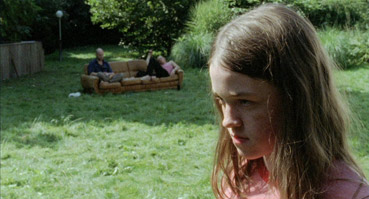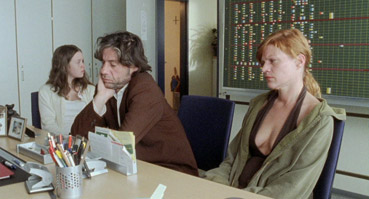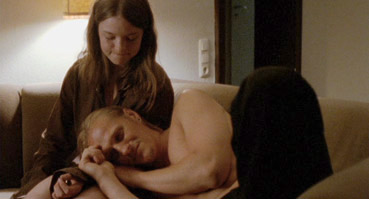|
It's not easy being a kid. Some, of course, have it a lot tougher than others, but at that age you're rarely equipped make that distinction – the universe is restricted to your immediate experience and the simplest of things can take on an inflated, sometimes catastrophic importance. It's only when we get older that our limited perception of the hard knocks of childhood tend to pale when compared to what others have gone through on the rocky road to adulthood.
It's an experience few films have successfully captured. This is hardly surprising, as by the time most filmmakers are old enough to have a true grasp on the medium, even the most vivid of childhood experiences have become recollections to be (re-) viewed through adult eyes. It's a rare director who can genuinely evoke the essence of childhood to the extent that even when the lives and experiences of the screen characters differ greatly from the viewer's own, the manner in which they are recorded can still stir vivid pangs of recognition. This is why you don't need to have been a working class Yorkshire lad to emotionally respond to Ken Loach's Kes, or a misunderstood French adolescent to feel for Antoine in François Truffaut's Les quatre cents coups, or a Swedish schoolgirl struggling with her awakening lesbianism to empathise wholeheartedly with Agnes in Lukas Moodysson's Show Me Love [Fucking Åmål]. Superb films all, their stories are told largely from the viewpoint of their young leads, and without a trace of the sentimentality that leaves so many coming-of-age dramas feeling just a little contrived, however entertaining they may otherwise be.

Only time will tell whether Pia Marias' captivating, acutely observed debut feature The Unpolished [Die Unerzogenen] will join these exalted ranks, but if you're drawing up a shortlist for future inclusion then this should definitely be on it. The child in question here is 14-year-old Stevie (played with impressively low key naturalism by newcomer Céci Chuh), who in the film's opening scene is having her hair cut by her mother Lily (an impressive, ego-free performance from Pascale Schiller), not at home or at some family run salon, but hurriedly at the roadside between cigarette puffs using bottled water for rinse. This makeship grooming is preparation for a re-unification with Stevie's father Axel (the wonderful Birol Ünel from Fatih Akin's Head On), freshly released from a prison stretch that has failed to put him on the straight and narrow. Saddled with her father's misdeeds and her mother's drug addiction (subtly signally by a number of small details in the opening few minutes), Stevie searches for friendship and a degree of social acceptance outside of the family unit.
There's a very personal element to the film's storytelling and structure, a series of shorthand recollections in which narrative and character information are dispensed on the move though overheard conversation or fleetingly observed incident. For some, this may initially prove a barrier to involvement, as we are asked to engage with the story before getting to really know its participants, but for others – myself included – this acts as a seductive hook, intriguing titbits from a narrative in motion that leave the audience to extrapolate the story from the fragments provided. This can occasionally be a little disorientating, as with the car journey that is interrupted by a police request to open a drug-packed suitcase that cuts straight to a shot of Stevie in transit in an unidentified vehicle to an undisclosed location – we're into the next scene before we can confirm exactly what just took place. It's a similar story with the supporting characters, particularly hanger-on Ingmar (Georg Friedrich, whom you may just recognise from Philipp Stölzl's Nordwande), whom we first encounter lounging on a sofa in an unspecified garden and whose back story and connection to Axel become clearer over time.

Given the potential for audience-punishing drama of its situation and storyline, a key strength of the film is its restraint and refusal to over-dramatise. Stevie's plight, if that word is even appropriate here, is observed without recourse to sentiment or melodrama and is refreshingly free of overstatement. Her sense of familial isolation and her search for acceptance is deftly captured in the photos she doctors to re-invent her life for others; in her attempt to attend a school at which she is not a pupil; in the wig that she steals to mirror-impersonate a sexually experienced adult; in the middle-class family she silently observes in their house before filling a bag with their belongings; in her come-ons to Ingmar that he appears to reject more because he's still pining for his departed girlfriend than any true sense of moral discomfort.
The Unpolished (and what an intriguing title that is) is not about pat narrative arcs or character journeys, but the fractured and subjective nature of the childhood experience and the manner in which we recollect it, where events are reduced to a few key moments to focus on the aspect of the experience that left the deepest impression on the storyteller. It comes as no surprise to learn that the film is at least partially based on director Marais' own childhood and its absence of stability and parental authority, a factual thematic base around which the fictional story is constructed, one whose every aspect is so acutely observed that it's impossible to separate memory from invention.
The film may deliver no big narrative twists or emotional body blows, but it nonetheless bristles with acutely observed detail and multi-layered subjective observation: Stevie's brief conversation with an African chauffeur; her on/off friendship with local boy Benny and their post-party house tour to photograph wasted guests; her stubborn determination when ejected from a class she unofficially attends; her ammo-free rifle sniping at passers-by; her pre-adolescent attempts to seduce Ingmar; the injury she lands whilst trying to break up a parental fight; the eye make-up that briefly transforms her into a comic book hero/villain; the fishnet stockings she draws on her leg; a late film hug she shares with her mother – a small sample from a list that could easily go on for a couple more paragraphs.

By telling its story through brief but always significant vignettes, the film feels as much shaped by Godard as Truffaut, if you'll forgive the analogy for a film that is neither. There are no sassy shortcuts to character engagement, and those who like their their stories cut to order may well struggle with a film that engages through a process of cinematic osmosis rather than the usual dramatic devices. Our empathy with Stevie comes not from a shared familial experience but her struggle with the same uncertainties, insecurities and longings that we all had at that age, which thanks to Marais' way with observational detail and young Chuh's winning naturalism are captured here with a sometimes uncanny precision. The result is everything a great modern observational drama should be – challenging, unexpected, daring, emotionally involving, and above all, truthful. Personally I can't wait to see what director Marais does next.
Despite the claim on the film's IMDb page that the film was shot on 35mm, a little research suggests the release print was actually the result of a Super-16 blow-up, a case supported by the very visible film grain, likely the result of using high speed stock to shoot in available light. In other respects the picture quality is fine – the sharpness is occasionally victim to light levels and resulting depth-of-field restrictions, but still holds its own in brighter locations, as evidenced in facial and hair detail and the clarity of Ingmar's shoulder tattoo in the riverside scene. The colours are a little muted and lean towards the earthy, particularly in night-time interiors, but given these restrictions, this is a very solid transfer. The framing is 1.85:1 and the picture is anamorphically enhanced.
The Dolby stereo 2.0 track boasts an excellent clarity and tonal range and very distinct stereo separation, well demonstrated by the passing of cars in the opening scene. The low-key but sometimes hypnotic score by Yoyo Röhm, Jochen Arbeit and Horst Markgraf is really well served here.
Interview with Pia Marais (16:06)
The gentle voiced Marais reveals in perfect English the ways in which the film is both autobiographical and fictional, and why she was determined to set it in the here and now, but spends the lion's share of the interview talking about the character of Stevie and young actress Céci Chuh, particularly the tricky area of the seduction scenes. A very worthwhile extra, it comes with a warning about spoilers and the suggestion that you'd watch it after the film, something ypu should frankly do with all special features.
Booklet
A booklet containing the main credits, stills, and a detailed essay by Brad Stevens, who praises the film for all the right reasons (he does a good job of explaining the appeal of the editing structure), but for reasons unknown uses Michael Haneke's Caché as a comparative whipping boy.
A film that hooks through intrigue and detail and gets under your skin through a process of almost sleight-of-hand seduction, The Unpolished is without question the most captivating and honest portrait of the emotional struggles and insecurities of childhood I've seen in some time, and a confident and structurally bold first film for director Marais. Second Run's DVD serves the film well given the 16mm blow-up, and the interview with Marais is a welcome extra. Recommended.
|